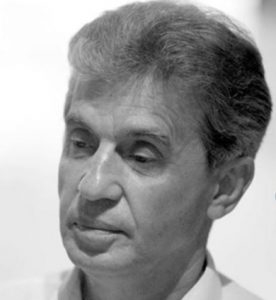Tamas Roska
After graduating, he began his career as an employee of the Instrument Industry Research Institute (MIKI). From 1970, he was the scientific department head and then the department head of the Telecommunications Research Institute (TKI).
In 1982, he became a scientific advisor at the Hungarian Academy of Sciences' Computer Science and Automation Research Institute (SZTAKI); in 1991, he was the head of the institute's Dual and Neural Computer Systems Research Laboratory, and then a research professor.
In 1990, he was a university professor at the Department of Automation and Informatics of the Faculty of Engineering of the University of Veszprém (VE), and the founding head of the technical informatics department of the university. In 1997, he was a university professor at BME (he left BME in 2002). In 1998, he was the founding dean of the Faculty of Information Technology (ITK) of the Pázmány Péter Catholic University (PPKE). He held his position as dean until 2006, after which he was the deputy dean of the faculty and the head of the Doctoral School.
In 1974 and from 1989 he was a visiting researcher at the University of California, Berkeley, where in the late 1980s, together with Professor Leon O. Chua, they developed a new type of computer, the cellular neural computer, and the related CNN (Cellular Neural Networks) chip. Based on this, the development of a bionic eye prosthesis, the Cellular Nonlinear Network chip (bionic eye), also began; he began to lay the theoretical foundation of the visual system together with József Hámori. The architecture of the analogical (i.e. partly analog, partly logical) cellular wave computer is associated with his name. The number of his publications is more than two hundred and four books; the number of his references is about 3,000.
In 1974 he became a candidate of technical sciences, and in 1982 a doctor of the Hungarian Academy of Sciences. Between 1987 and 1992 he was a member of the Scientific Qualification Committee of the Hungarian Academy of Sciences. From 1993 he was a corresponding member of the Hungarian Academy of Sciences, and from 1998 a full member. From 1993 to 1998 he was the chairman of the Hungarian Academy of Sciences' Informatics Committee.
His awards: Dénes Gábor Prize (Novofer Foundation, 1993); Albert Szent-Györgyi Prize (Minister of Education, 1994); Széchenyi Prize (shared with József Hámori, Hungarian State, 1994); Kalmár Prize (NJSZT, 1994); Pro Renovanda Cultura Hungariae Foundation Grand Prize (2000); János Bolyai Creative Prize (Bolyai Prize Foundation, 2002); Príma Prize (Prima Primissima Foundation and the Social Advisory Board, 2007); Middle Cross of the Order of Merit with Star of the Republic of Hungary (2010); Order of Saint Gregory the Great (Vatican, 2010); Mac Van Valkenburg Prize (Institute of Electrical and Electronics Engineers (IEEE), 2013). Since 2013, he has been an honorary doctor of the Catholic University of Leuven.
On December 14, 2019, the Hungarian Heritage and Europe Association awarded the Hungarian Heritage Award to the family of Tamás Roska.
In 2017, the National Scientific Student Council (OTDT) established the Tamás Roska Scientific Lecture Institute to support talent development and scientific research activities at various levels of higher education.
- Honorary citizen of the city of Ózd.
Created: 2016.07.02. 17:23
Last modified: 2024.05.25. 14:11

